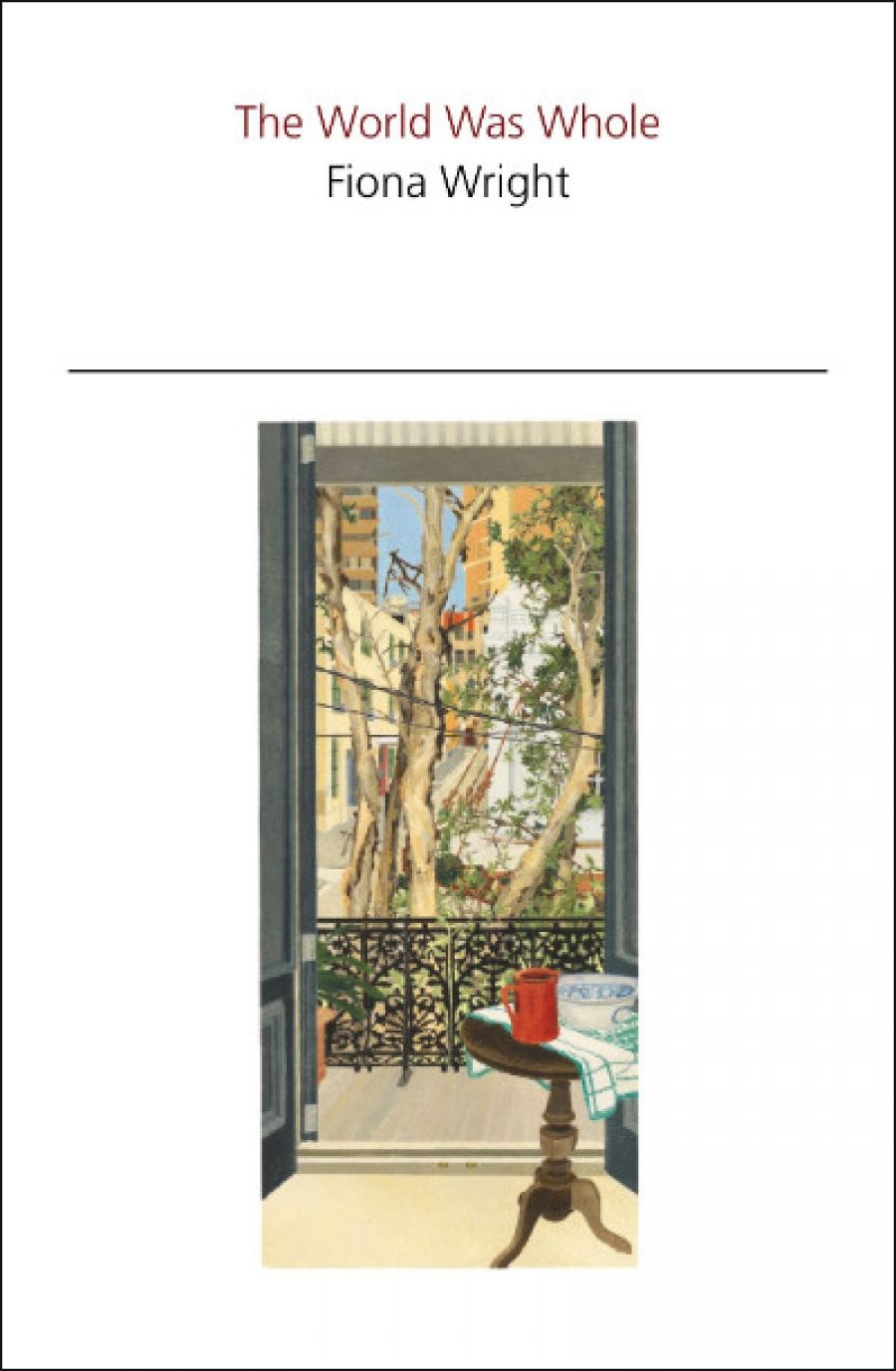
- Free Article: No
- Contents Category: Essay Collection
- Custom Article Title: Francesca Sasnaitis reviews 'The World Was Whole' by Fiona Wright
- Custom Highlight Text:
For a homeless person, home is the street and the moveable blanket or bedroll. Ultimately, the only home remaining is the body. Fiona Wright is not homeless, she has been un-homed by her body’s betrayal. Whether she can ever feel that she fits again is the primary theme of ...
- Book 1 Title: The World Was Whole
- Book 1 Biblio: Giramondo, $29.95 pb, 256 pp, 9781925336979
The association of emptiness with wholeness makes a compelling metaphor for anorexia, the illness with which Wright grapples. Why she chose to edit the phrase ‘In its emptiness’ from the lines she quotes might be intended to reinforce her argument that each world or life is whole unto itself.
In her award-winning first collection, Small Acts of Disappearance: Essays on hunger (2015), Wright unravelled the genesis of her illness. She wrote unsparingly about the eating disorder that began when she was nineteen and still living ‘at home’ with her parents. The rare physical condition that caused her to vomit without volition after most meals went undiagnosed for eighteen months. She was advised to excise foods she thought might trigger the vomiting from her diet until, she writes tellingly, ‘hunger became my safest state’. For Wright, purging was learned behaviour; she did not think of herself as anorexic.
Ostensibly, Anorexia nervosa is not the subject of her second collection, but as anyone who has experienced a chronic medical or psychiatric condition will attest, illness or pain tends to overshadow every other aspect of existence. The idea that the person is the disorder, however, is precisely what Wright has spent the last fifteen years or so of her life resisting. What she finds most damaging is the punitive language of illness, which sets the body up as a battlefield and implies a lack of will or determination if the invader is not routed. She resists the rhetoric that denigrates the routines necessary to her survival, as if repetition is less valid than spontaneity, and she struggles to convince herself that imperfect health does not mean an incomplete life.
In Glück’s poem, Wright also finds echoes of Virginia Woolf’s A Room of One’s Own. She names her dog Virginia and is loath to admit that it took an animal to teach her the joys of interdependence. It is novel for her to feel needed and, although she questions our anthropomorphic tendencies, is comforted by what she perceives as Virginia’s unconditional love. Anorexia is the opposite, she says. Anorexia teaches self-sufficiency and necessitates shutting down needs in order to avoid pain and disappointment, a sad variation on the Buddhist tenet that tells us the root of all suffering is attachment. Both ‘body’ and ‘home’ have become tropes for what Wright actually wants: ‘shelter, and security, a stable base from which to build my self and life without constant inconstancy’. Wright’s freelance status leaves her financially insecure, but her world is hardly empty. She surrounds her recalcitrant body with the minutiae of existence, and particularly in the pivotal essay, ‘The World Was Whole Always’, draws together those disparate fragments, impressions, and images into an arresting bricolage. Humorous anecdotes are juxtaposed with poignant reminders of what she cannot hope to be; acute observations work against each other and in tandem.
 Fiona Wright (photo via Giramondo Publishing)
Fiona Wright (photo via Giramondo Publishing)
Returning from a teaching job in the northern suburbs of Sydney, she observes ‘the sun … spraying like an errant garden hose through a crack in the cloud cover’. By the time her train reaches Erskineville, ‘the sky is pink, electric’, the rosy glow of nostalgia descending over the streets of Newtown and Marrickville. Only occasionally does her world of house hunting, shared living, parties, social anxiety, housemates and their peccadilloes, and local cafés seem like a rarefied version of Sydney’s inner-west, made overly precious by an insistent poeticism underscored by apposite lines from Les Murray, Grace Paley, and Gwen Harwood.
Not that Wright is without humour. Her intense introspection is leavened by self-deprecating insights. At a writers’ conference in Reykjavik, where she manages to travel despite her illness and her fears, Wright is confronted by the spectacle and strangeness of Iceland’s geography, and draws a parallel between her condition and the language of volcanic action: spew, disgorge, heave, spit. ‘Great,’ she writes, ‘I’m fucking seismic now.’
The confessional nature of Wright’s essays tends to provoke solicitude. Sometimes she seems very young and unsettled, her future at risk. On the other hand, her bravery is impressive. She is unflinching in revealing the progress, if one can call it that, of her illness. Perhaps being born in the 1980s makes her a member of the generation for whom public self-disclosure is routine, but, given the extreme consequences of her anxiety, her trust in the compassion of the reader is baffling. Perhaps sympathy is not the issue. The essays collected in The World Was Whole shape an informal autobiographical narrative that seeks neither pity nor special consideration. Any sympathy evinced is the incidental result of Wright’s talent for eloquent and graceful prose.


Comments powered by CComment